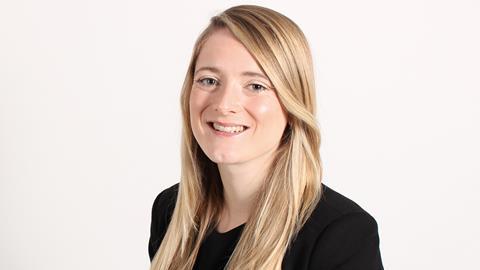Solicitor-advocate Kate Fawell-Comley is a senior associate in healthcare & public law
I almost didn’t become a lawyer. I was studying law at university in London and a careers events focused on corporate law. I wanted to do something that involved getting out, and meeting and helping people. I considered going into teaching, but in my last year of university I studied a module in healthcare law and it clicked.
My firm offers sector-specific training contracts. All of the seats that were part of my training contract therefore had a ‘health’ element. I also spent seven months of my training contract in-house at two different NHS trusts. This ‘on the ground’ experience was hugely beneficial to my development and subsequent career. Working in an NHS trust is never predictable. I really enjoyed building relationships with clinicians who would come to see me to ask for legal advice on a whole host of topics.
While I have a wide experience in healthcare law, I spend most of my time representing healthcare providers, public and private, at inquests. Inquests are unusual – even many of my friends in the legal profession don’t know much about them. As non-adversarial proceedings with a bereaved family at their heart, they are a really important part of our legal system which enable families to gain answers about what happened to their loved one. They also enable systemic learning in a variety of sectors, in particular healthcare. Nonetheless, any court proceedings are stressful for a clinician to attend as a witness, and I do enjoy supporting and guiding healthcare professionals through this process.
'I have volunteered with Girlguiding UK for 12 years… It is really important that girls and young women have role models in their life'
As with many courts, there are backlogs of cases in the coroners’ courts resulting from the pandemic. I’m really busy and attend inquests nearly every week. The ones I am involved in relate to deaths in a variety of settings including emergency and acute care, prisons and mental health hospitals. We are seeing first-hand the impact of the pandemic and the associated pressures on healthcare services in inquests. This only serves to reinforce the importance of the coronial system.
When not working I am nearly always volunteering. I have volunteered with Girlguiding UK for 12 years, initially running a Brownies unit while a student in London as a means of connecting with the local community. I have had incredible experiences as a volunteer, including delivering training to the national leadership team of the Girl Guides Association in Rwanda. I am now assistant chief commissioner for Girlguiding London and South East England and am responsible for meeting the needs of our 10,000 volunteers in the region.
Voluntary leadership roles have been instrumental in my career development, in particular in my promotion to senior associate at Hill Dickinson. It is really important that girls and young women have role models in their life who have careers but who also volunteer to help them. I seem to have a higher-than-average number of Guides in my local area interested in becoming lawyers. Hill Dickinson is very supportive in enabling me to volunteer, in particular through the use of volunteering leave. Many firms offer volunteering leave, and I would love it if more people would use it to help the many charities, Girlguiding UK included, who greatly need volunteers to operate.
































No comments yet